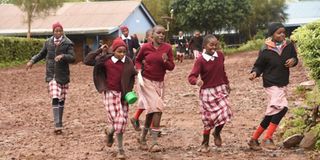Maniza Zaman: Prioritise issues affecting children

Pupils of Kibiko Primary School in Kajiado County in a photo taken on January 13, 2020.
The General Election will shape the future of Kenya at a critical point in history. The country is emerging from the shadow of the Covid-19 pandemic, but now faces new challenges over the cost of living, global food supplies, drought and climate change. Children will be most affected by these issues.
Almost half of Kenyans are children. Government services have an impact on their well-being, safety and development.
Children do not vote – but if they did, they would be looking at critical issues that affect them today and their life chances in future.
Parents vote, as do older siblings, family and community members. That is why we are calling on political parties and candidates to prioritise children’s issues and for the voting public to carefully consider the issues being debated and their impact on children.
Unicef has conducted an analysis of the situation of children and spoken to children and young people through our Changing Childhood Project. We have identified six priority issues for children that we are asking the next government to focus on.
These are the early years of a child’s life, enhancing learning, primary health care and community health, social protection, ending violence on children and climate change.
We will focus on enhancing learning and climate change in this issue.
Kenyan students should thrive in an education system that prepares them for the future workplace and society. Digital literacy is a key part of this.
Yet, the majority of public primary schools are not connected to the Internet. Kenya will be well positioned to compete on the global stage if all children acquire digital skills.
Kenya ranks 49th out of 163 countries in terms of risks to children from climate change. Children and young people are the least responsible for global warming, yet they will bear the greatest burden of its impact.
Extreme weather events are increasing in Kenya, including droughts and floods, to which children are particularly vulnerable.
Importantly, these are not just children’s issues. They also link to the UN Sustainable Development Goals, which Kenya has signed up to. While progress has been made towards SDGs, several are off track and prioritising these issues can bring about the needed acceleration to reach Kenya’s and global developmental goals.
Given the number of children in Kenya and to ensure children’s issues are fully addressed by the next government, Unicef recommends that a Ministry of Children’s Affairs be created, either as a standalone or in combination with other portfolios and with a significant budget. We also recommend a special adviser on children’s issues in the office of the President.
Our call is for the children. They matter, have rights and must engage meaningfully in the trajectory of their country. Our call is also for the voting public – it is your responsibility to build a Kenya in which every girl and boy is nurtured, loved and supported to fulfill their dreams. It can be done.
Maniza Zaman is Unicef Representative to Kenya





